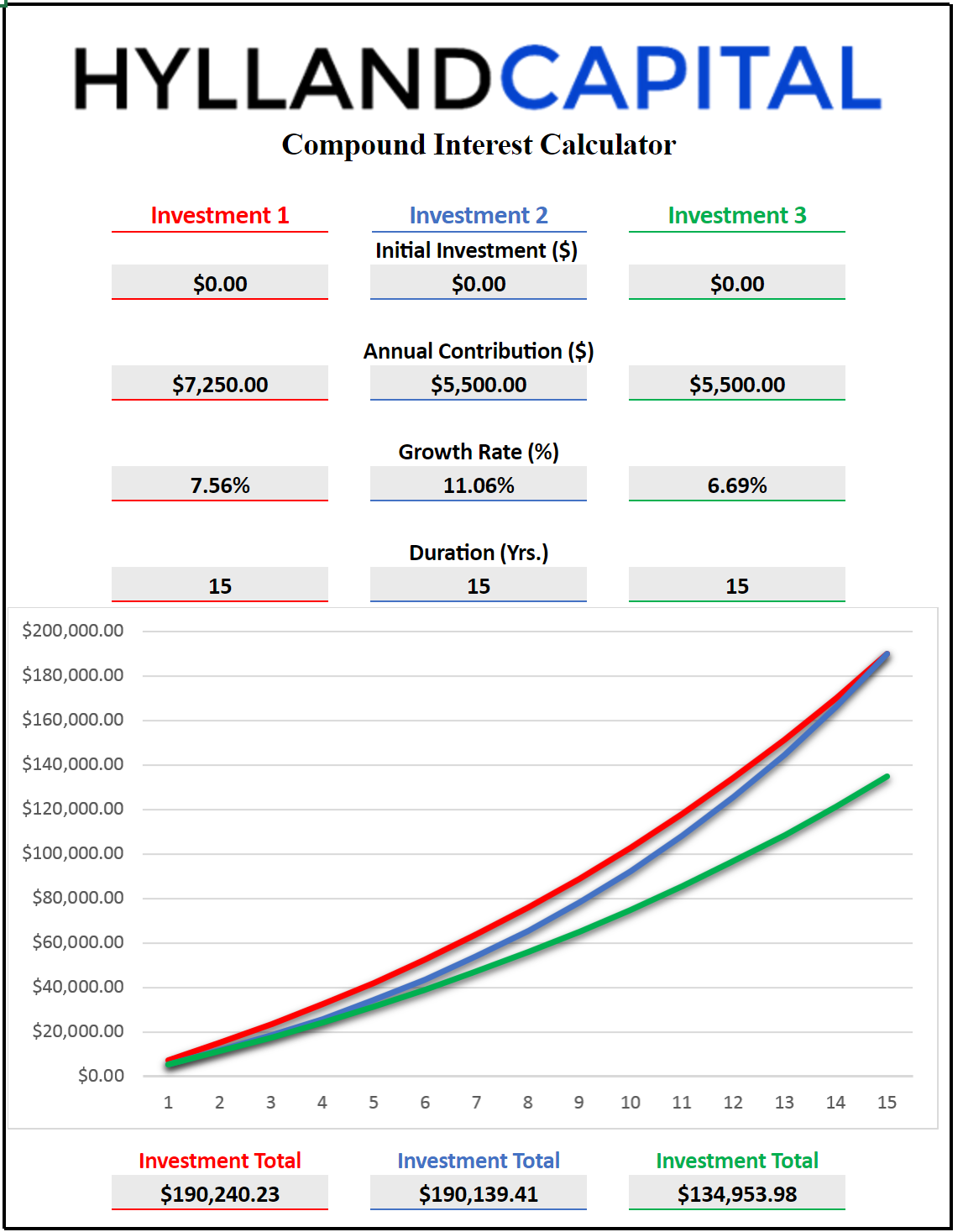A Guaranteed Way to Match the Market's Top-Performing Fund
If you (or your financial adviser) are spending all your time looking for the VERY BEST investment out there, you might be missing out on a sure thing.


Profit and prosper with the best of Kiplinger's advice on investing, taxes, retirement, personal finance and much more. Delivered daily. Enter your email in the box and click Sign Me Up.
You are now subscribed
Your newsletter sign-up was successful
Want to add more newsletters?

Delivered daily
Kiplinger Today
Profit and prosper with the best of Kiplinger's advice on investing, taxes, retirement, personal finance and much more delivered daily. Smart money moves start here.

Sent five days a week
Kiplinger A Step Ahead
Get practical help to make better financial decisions in your everyday life, from spending to savings on top deals.

Delivered daily
Kiplinger Closing Bell
Get today's biggest financial and investing headlines delivered to your inbox every day the U.S. stock market is open.

Sent twice a week
Kiplinger Adviser Intel
Financial pros across the country share best practices and fresh tactics to preserve and grow your wealth.

Delivered weekly
Kiplinger Tax Tips
Trim your federal and state tax bills with practical tax-planning and tax-cutting strategies.

Sent twice a week
Kiplinger Retirement Tips
Your twice-a-week guide to planning and enjoying a financially secure and richly rewarding retirement

Sent bimonthly.
Kiplinger Adviser Angle
Insights for advisers, wealth managers and other financial professionals.

Sent twice a week
Kiplinger Investing Weekly
Your twice-a-week roundup of promising stocks, funds, companies and industries you should consider, ones you should avoid, and why.

Sent weekly for six weeks
Kiplinger Invest for Retirement
Your step-by-step six-part series on how to invest for retirement, from devising a successful strategy to exactly which investments to choose.
Who doesn’t want the best? Of course, we all do. But sometimes our search for the very best investments can lead us astray if we lose sight of the big picture. While you’re sifting through a haystack worth of investments to find that golden needle, you just may be overlooking something even more important that ends up costing you a lot.
According to Morningstar, the top-performing large-cap U.S. equity fund over the last 15 years is the AMG Yacktman Focused Fund (Ticker: YAFFX). As of May 2017, the fund has had an annualized return of 11.06% over the last 15 years, beating the S&P 500 index by 3.5 percentage points.

Of course, the important question we all want the answer to is not who has been the best fund manager, but instead who will be the next best fund manager.
From just $107.88 $24.99 for Kiplinger Personal Finance
Become a smarter, better informed investor. Subscribe from just $107.88 $24.99, plus get up to 4 Special Issues

Sign up for Kiplinger’s Free Newsletters
Profit and prosper with the best of expert advice on investing, taxes, retirement, personal finance and more - straight to your e-mail.
Profit and prosper with the best of expert advice - straight to your e-mail.
But picking the next great investment manager is hard, and it becomes more unlikely the longer you hold your investment. According to a recent study by S&P, 92% of large cap fund managers have underperformed the S&P 500 over the last 15 years.
The Hottest Fund Out There Can’t Beat This Strategy
Part of any adviser’s or investor’s job is to allocate their investments. As an adviser, I consider it a big part of my work to find the best funds for my clients. So, I wondered, what should I be doing to try and find the next AMG Yacktman?
Some may jump to finding the manager with the next hot quantitative algorithm, bury their nose in prospectuses and annual reports, or try to book golf outings with fund managers and CEOs. But I think I found a better, much easier, much more certain way of keeping up with AMG Yacktman, (or whoever the next top dog is): Save an extra $145 per month.
Consider an investor who, starting in 2002, saved $5,500 per year into AMG Yacktman’s fund (listed as Investment No. 2 in the chart below), and another investor who saved $7,250 per year (an extra $145.83 per month) into a basic, low-cost S&P 500 index fund (Investment No. 1 in the chart below). Who came out on top after 15 years?

The green line (Investment No. 3) in the chart above is the performance of the average large-cap U.S. equity fund, per the S&P study cited above.
For all the blood, sweat and tears that go into the hundreds of large-cap equity funds in an attempt to produce returns that best the S&P 500, isn’t it ironic that the effective long-term performance for a small investor in the top-performing large-cap fund can be matched by a small investor who is willing to save just a little bit more every month?
And yet, a majority of investors and financial advisers will devote countless hours and dollars in an attempt to find the few needles in Wall Street’s legendary haystack that will outperform.
Of course, there is a bigger point than just exactly how much money you need to save to match AMG Yacktman’s performance. The exact numbers will change if you consider different time horizons or amounts to be invested. You can play around with specific numbers with a compound interest calculator, like the one we used above here: http://www.hyllandcapital.com/blog/compound-interest-rate-calculator.
The Key Takeaway for Investors
The bigger point is that time spent focusing on elements of your financial plan that are within your control will yield much more certain, and very likely better, results for your portfolio.
What is more likely to positively affect the long-term value of your portfolio? Spending hours, days or even months evaluating fund managers, with a hope of picking the best one over the next 15 years? With history as our guide, we know you have only a small chance of succeeding at this option…
Or instead, should you focus your attention on your own finances and find a way to save a little extra every month?
Increasing your saving rate, no matter how much, has a 100% chance of increasing the value of your portfolio. No amount of investment research will yield the same certainty.
How that Might Apply to Your Financial Advice
As a financial adviser myself, is my time better spent evaluating fund managers? Or finding ways to save clients $145? My guess is I am much more likely to be successful finding $145 in savings in investment fees, taxes and spending rather than finding the most successful fund manager for the next 15 years.
If the next 15 years is anything like the last, the best use of your time will likely be spent doing the same.
Profit and prosper with the best of Kiplinger's advice on investing, taxes, retirement, personal finance and much more. Delivered daily. Enter your email in the box and click Sign Me Up.

Matt is the founder of Hylland Capital Management, a fee-only, virtually based financial planning and investment advisory firm designed for today's young professionals. Matt is a member of the XY Planning Network.
-
 Nasdaq Leads a Rocky Risk-On Rally: Stock Market Today
Nasdaq Leads a Rocky Risk-On Rally: Stock Market TodayAnother worrying bout of late-session weakness couldn't take down the main equity indexes on Wednesday.
-
 Quiz: Do You Know How to Avoid the "Medigap Trap?"
Quiz: Do You Know How to Avoid the "Medigap Trap?"Quiz Test your basic knowledge of the "Medigap Trap" in our quick quiz.
-
 5 Top Tax-Efficient Mutual Funds for Smarter Investing
5 Top Tax-Efficient Mutual Funds for Smarter InvestingMutual funds are many things, but "tax-friendly" usually isn't one of them. These are the exceptions.
-
 Social Security Break-Even Math Is Helpful, But Don't Let It Dictate When You'll File
Social Security Break-Even Math Is Helpful, But Don't Let It Dictate When You'll FileYour Social Security break-even age tells you how long you'd need to live for delaying to pay off, but shouldn't be the sole basis for deciding when to claim.
-
 I'm an Opportunity Zone Pro: This Is How to Deliver Roth-Like Tax-Free Growth (Without Contribution Limits)
I'm an Opportunity Zone Pro: This Is How to Deliver Roth-Like Tax-Free Growth (Without Contribution Limits)Investors who combine Roth IRAs, the gold standard of tax-free savings, with qualified opportunity funds could enjoy decades of tax-free growth.
-
 One of the Most Powerful Wealth-Building Moves a Woman Can Make: A Midcareer Pivot
One of the Most Powerful Wealth-Building Moves a Woman Can Make: A Midcareer PivotIf it feels like you can't sustain what you're doing for the next 20 years, it's time for an honest look at what's draining you and what energizes you.
-
 I'm a Wealth Adviser Obsessed With Mahjong: Here Are 8 Ways It Can Teach Us How to Manage Our Money
I'm a Wealth Adviser Obsessed With Mahjong: Here Are 8 Ways It Can Teach Us How to Manage Our MoneyThis increasingly popular Chinese game can teach us not only how to help manage our money but also how important it is to connect with other people.
-
 Looking for a Financial Book That Won't Put Your Young Adult to Sleep? This One Makes 'Cents'
Looking for a Financial Book That Won't Put Your Young Adult to Sleep? This One Makes 'Cents'"Wealth Your Way" by Cosmo DeStefano offers a highly accessible guide for young adults and their parents on building wealth through simple, consistent habits.
-
 Global Uncertainty Has Investors Running Scared: This Is How Advisers Can Reassure Them
Global Uncertainty Has Investors Running Scared: This Is How Advisers Can Reassure ThemHow can advisers reassure clients nervous about their plans in an increasingly complex and rapidly changing world? This conversational framework provides the key.
-
 I'm a Real Estate Investing Pro: This Is How to Use 1031 Exchanges to Scale Up Your Real Estate Empire
I'm a Real Estate Investing Pro: This Is How to Use 1031 Exchanges to Scale Up Your Real Estate EmpireSmall rental properties can be excellent investments, but you can use 1031 exchanges to transition to commercial real estate for bigger wealth-building.
-
 Should You Jump on the Roth Conversion Bandwagon? A Financial Adviser Weighs In
Should You Jump on the Roth Conversion Bandwagon? A Financial Adviser Weighs InRoth conversions are all the rage, but what works well for one household can cause financial strain for another. This is what you should consider before moving ahead.